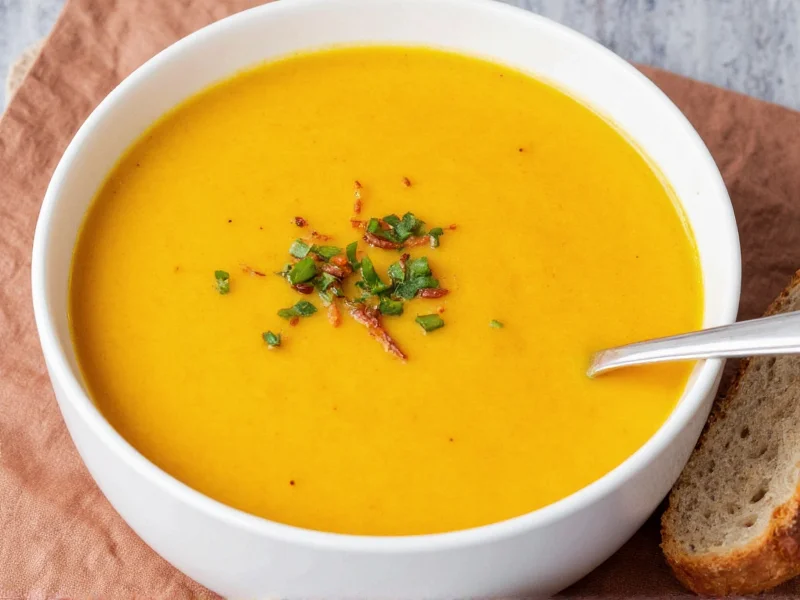Nothing comforts like a warm bowl of homemade squash soup, especially when crafted with seasonal ingredients and thoughtful technique. These versatile recipes transform humble winter squash into restaurant-quality meals that impress with minimal effort. Whether you're seeking a quick weeknight dinner or an elegant starter for guests, squash soup delivers rich flavor and nutritional benefits in every spoonful.
Why Squash Soup Belongs in Your Recipe Rotation
Winter squash varieties offer exceptional nutritional profiles packed with vitamins A and C, fiber, and antioxidants. Their natural sweetness balances beautifully with savory herbs and spices, creating complex flavors without excessive added sugar. Unlike many comfort foods, properly prepared squash soup remains light yet satisfying—a perfect transition dish from summer to winter menus.
Top Squash Varieties for Soup Making
Not all squash works equally well in soups. These three varieties deliver optimal texture and flavor:
| Squash Type | Flavor Profile | Best Cooking Method | Prep Time |
|---|---|---|---|
| Butternut | Sweet, nutty, smooth | Roasting enhances caramelization | 20 minutes |
| Acorn | Earthy, slightly peppery | Simmering preserves texture | 15 minutes |
| Delicata | Creamy, corn-like sweetness | Peel not required for soup | 10 minutes |
Essential Techniques for Flavorful Squash Soup
Professional chefs rely on these methods to elevate simple ingredients:
- Roast before blending—Caramelizing squash at 400°F develops deeper flavors than boiling
- Sweat aromatics slowly—Cook onions and garlic in olive oil until translucent (5-7 minutes) to build flavor foundation
- Use homemade stock—Vegetable or chicken stock adds complexity versus water
- Finish with acid—A splash of apple cider vinegar or lemon juice brightens rich flavors
Three Signature Squash Soup Recipes
Classic Butternut Squash Soup (40 minutes)
This foolproof recipe delivers velvety texture without heavy cream. Roasting concentrates the squash's natural sugars while apple cider adds subtle sweetness.
Ingredients:
- 1 medium butternut squash (3 lbs), peeled and cubed
- 1 large apple, cored and chopped
- 1 onion, diced
- 2 cloves garlic, minced
- 4 cups vegetable broth
- 2 tbsp olive oil
- 1 tsp fresh thyme
- ½ tsp ground nutmeg
- Salt and pepper to taste
Instructions:
- Toss squash and apple with 1 tbsp olive oil, spread on baking sheet, roast at 400°F for 25 minutes
- Sauté onion and garlic in remaining oil until soft
- Add roasted squash, broth, thyme, and nutmeg; simmer 10 minutes
- Blend until smooth using immersion blender
- Season with salt, pepper, and 1 tbsp apple cider vinegar
Roasted Acorn Squash Soup with Sage (45 minutes)
This earthy preparation features crispy fried sage leaves as garnish. Acorn squash's denser texture creates a heartier soup ideal for colder months.
Pro Tip: Reserve squash seeds, rinse, toss with oil and salt, then roast at 300°F for 15 minutes for crunchy topping.
Creamy Delicata Squash Soup (Dairy-Free) (35 minutes)
Delicata's thin skin makes prep effortless while coconut milk adds luxurious texture without dairy. This recipe accommodates vegan diets without sacrificing richness.
Key Modification: Replace traditional cream with ½ cup full-fat coconut milk added after blending for identical texture.
Dietary Adaptations for Special Needs
Thoughtful adjustments make squash soup accessible to various dietary requirements:
- Gluten-free: Ensure broth is certified GF (most are, but check labels)
- Vegan: Use vegetable broth and coconut milk instead of dairy
- Low-sodium: Roast squash with herbs instead of salt; use low-sodium broth
- Higher protein: Stir in ½ cup white beans after blending
Proven Methods to Avoid Common Mistakes
Even experienced cooks encounter these squash soup pitfalls:
- Watery texture: Roast squash first to evaporate excess moisture
- Bland flavor: Always season in layers—while roasting, sautéing, and finishing
- Stringy consistency: Use immersion blender instead of food processor
- Overpowering sweetness: Balance with acid (lemon juice or vinegar)
Storage and Reheating Guidelines
Squash soup freezes exceptionally well. Follow these steps for optimal results:
- Cool completely before storing (prevents condensation)
- Portion into 1-2 cup containers with ½ inch headspace
- Freeze up to 3 months (label with date)
- Thaw overnight in refrigerator before reheating
- Reheat gently on stove (avoid boiling to preserve texture)
Frequently Asked Questions
Can I use frozen squash for soup recipes?
Yes, frozen squash works well in soups. Thaw completely and drain excess liquid before using to prevent watery texture. Roasting thawed squash enhances flavor compared to using it directly from frozen.
How do I thicken squash soup without cream?
Blend cooked white beans or cauliflower with the soup for natural thickening. Alternatively, simmer uncovered for 10-15 minutes to reduce liquid, or add 1-2 tbsp cornstarch slurry near the end of cooking.
What herbs pair best with squash soup?
Sage, thyme, and rosemary complement squash's earthiness. Add dried herbs early in cooking; stir in fresh herbs during the last 5 minutes. A pinch of cayenne or smoked paprika adds depth without overpowering sweetness.
Can squash soup be made in an Instant Pot?
Yes—use sauté function for aromatics, add 2 cups broth and cubed squash, then pressure cook 8 minutes. Quick release, blend, and finish with seasonings. Total time: 25 minutes with 10 minutes active prep.











 浙公网安备
33010002000092号
浙公网安备
33010002000092号 浙B2-20120091-4
浙B2-20120091-4